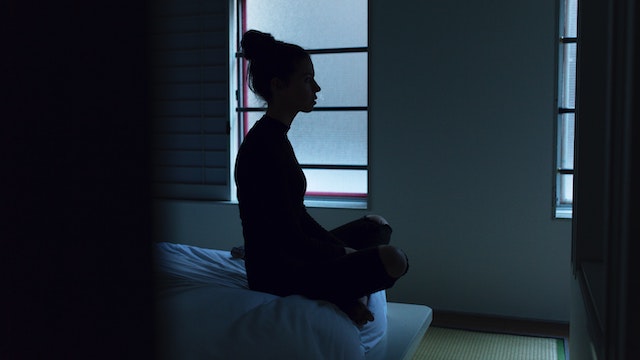How homeopathy can help a good night’s sleep by Dr Keith Souter
Being unable to sleep can be one of the most frustrating conditions. People often complain that they feel alone, isolated by their wakefulness when everyone around them is deep in the arms of Morpheus. Yet insomnia is very common. Sleep troubles affect 25 per cent of people at some point, and over ten per cent of the adult population have a chronic problem with insomnia.There have been many famous insomniacs. Vincent Van Gogh apparently used to douse his mattress and pillow regularly with a strong concentration of camphor in an effort to deal with his sleeplessness. Marilyn Monroe was another regular insomniac who used hypnotics to get off to sleep and whose sad death was thought to have resulted from an overdose of sleeping tablets. Judy Garland’s problems with sleep seemed to arise from an addiction to amphetamines, which kept her awake and which she countered by taking sleeping tablets. Finally, Groucho Marx developed intractable insomnia after the 1929 Wall Street Crash in which he lost a fortune. Rather than turning to alcohol or sleeping tablets he developed a unique method of easing his isolation during his sleepless nights. He randomly used to ring up total strangers and insult them on the telephone. It did not help him to sleep, but it apparently mellowed his temper.
Normal sleep
Work in sleep laboratories extending back over the last four decades has advanced our knowledge of the physiology of sleep. During a normal sleep time we seem to go through several cycles of sleep composed of four stages of non-rapid eye movement (NREM) and rapid eye movement (REM) sleep, in an ebb and flow manner as depicted in the diagram in the PDF version of this article.NREM sleep is divided into four progressively deeper stages. Stage I, light sleep, stage II, middle sleep, and stages III and IV, deep, delta-wave sleep. REM sleep, when dreaming occurs, follows NREM sleep and occurs in four or five episodes during a sleep time of about eight or nine hours. Generally, the first REM burst lasts about ten minutes, while the last may occur for over an hour or two. If you divide a sleep time of nine hours into three periods of three hours, then the first third will be predominantly NREM sleep and the last third will be mainly REM sleep. If one wakens from a full and good night’s sleep then it is usually from REM sleep or a short episode of stage I NREM sleep, when you have a recollection of your last dream, before it disappears as you grasp consciousness.Stage I NREM sleep occurs at the start of sleep and at potentially wakeful times during the night. It makes up about five to ten per cent of total sleep time. It is characterised by twitches and occasional jerking movements. Sometimes one may experience “hypnagogic pseudo-hallucinations” at this time, such as when one imagines falling off a gate and jerking awake. They are of no significance. Stage II, when one becomes less aware of the external environment occurs throughout the sleep cycle and makes up about 40 to 50 per cent of sleep time. Stages III and IV occur mainly in the first third of the night and account for about 20 per cent of the sleep time. Sleep-walking, night terrors and bed-wetting all seem to occur in this part of the sleep cycle. Stage IV is the hardest sleep to be roused from. REM sleep makes up the remaining 20 to 25 per cent of the sleep time.Even now we are not sure about the functions of the individual stages of sleep, but it seems that the whole process is essential to brain functioning and to general health of the body. It is thought that NREM sleep is associated with growth and repair of the brain and body, and that REM is associated with mental functions, dreaming and processing of memory.
Changes in sleep patterns
Infants sleep for about 14 to 16 hours a day, in several episodes. REM sleep predominates at the expense of stages III and IV NREM. Older children develop a pattern more akin to an adult, with the noted adolescence period being characterised by excessive somnolence. Then in the elderly, there is a 10 to 15 per cent reduction in stages III and IV NREM sleep, less REM sleep, and an increase in stage II NREM by about five per cent. Physiologically, this means that to have the complete restorative sleep, the total time in bed must increase. Unfortunately, because more time is spent in the lighter stages of sleep there is more opportunity for various medical conditions to impinge on the sleeper and waken them to cause a complaint of insomnia.
Insomnia
As with any human parameter, it is hard to lay down numbers about ideal durations of sleep. Some people may sleep efficiently for six hours with no complaint, yet others need a full eight or nine hours of unbroken sleep. Insomnia is therefore a highly subjective complaint.A reasonable working definition of insomnia could therefore be: a complaint of difficulty in initiating and/or maintaining satisfying sleep.Insomnia is one of those conditions where there is immense variation in the sort of problem that it causes. There may be difficulty falling asleep, difficulty staying asleep, waking early, or just feeling unrefreshed. And of course, there can be secondary effects, such as daytime fatigue, poor concentration and irritability.There may be obvious causes of insomnia, such as prostate problems in men, bladder problems, heart failure, hormonal changes and various arthritic or painful conditions. There may be underlying psychological causes such as simple worry, more marked anxiety or depression. Habit problems, such as too much caffeine, tobacco or alcohol, or side-effects from medication may also play a part. And, of course, restless or noisy bed-fellows may be keeping one awake. Finally, if the individual is a snorer then sleep apnoea needs to be considered. In this condition the respiratory drive is low during sleep, causing periods when the individual stops breathing and either snores loudly or wakes up. If this is suspected then a medical opinion should be sought.
Homeopathy & insomnia
Homeopathy can often make a big difference to insomniacs. The approach is to consider the sleep disturbance as part of the overall clinical picture. There is no such thing as a homeopathic sleep-ing-tablet, just as there is no such thing as a homeopathic painkiller. The well-selected remedy, if it includes the pattern of the sleep disturbance, may solve the problem.Having an awareness of what happens during the sleep cycle can be helpful, in that it might indicate a remedy or group of remedies. For example, dutiful types who tend to waken in the early hours with an aggravation of some symptom or another between two and four may well need one of the Kali salts.The following patterns may also help in the choice of a remedy.
Difficulty dropping off
This is a common problem with anxiety states, so the remedies in which an anxiety component is prominent may help. Aconite may help the person who panics on going to bed. They may fear sleep; feel that they might not wake up, so sleep could take on the spectre of death. Arsenicum album may help the restless, meticulous type of person who cannot get off to sleep because they have to get everything ordered in their mind.
Light sleeping
Wakefulness from the least background noise is suggestive of a need for Coffea with its heightened sensitivity and inability to get into the deeper stages of sleep. Asarum also helps when any noise wakens the sleeper, especially if they have great sensitivity to any noise during the day. Insomnia after over-indulgence in stimulants, food, drink or after overexerting oneself late in the day may indicate Nux vomica.
Frequent waking
In addition to those who are very light sleepers, the following remedies may help those people who seem to wake frequently, and who may find that they lie awake for an hour or so before getting off again. Alumina might help, especially if in the morning the individual is slow, dull and subject to awareness of symptoms or aggravations of other conditions on waking. Baryta carb may have this pattern, but also be prone to waking from nightmares. And Hepar sulph, one of the most sensitive of remedies, might suit the person who wakes if a toe or foot somehow gets exposed in the night.
Restlessness
Here we have to consider any physical condition that may be causing the restlessness. Treating that with the appropriate remedy may help, but otherwise the following restless remedies may be useful. Ignatia is useful in people who experience insomnia after a loss of some sort. They may sigh and yawn a lot, yet find sleep difficult to come, and find it fitful at best. They may twitch, toss and turn and be subject to nightmares. Natrum muriaticum is also frequently indicated in insomnia after bereavement, slight or loss. The pattern of insomnia here may be associated with feeling isolated, feeling aggrieved and finally crying themselves off to fitful sleep.Zincum metallicum may help the nervous type of person prone to twitchy feet and restless legs. Arnica may help when the individual cannot get comfortable, because the bed (whatever it is like) just feels too hard.
Early morning waking
By this I mean waking at 4 or 5am onwards and not being able to fall off again. This is very common in sadness and depression. Aurum metallicum needs to be considered when the individual feels totally down, perhaps with thoughts of self-harm. Waking early and feeling angry and down may be helped by Staphysagria, especially if there is a tendency to feel sleepy throughout the waking day. Whereas those needing Staphysagria might not actually vent their anger, people who wake feeling down and cross, and who are decidedly prickly to those around them may benefit from Nitric acid.
Too hot or too cold
When someone often wakes up suddenly, usually from an anxiety dream, feeling hot with a sweaty head, then Silica may help. Others who also wake up with their head bathed in perspiration, especially if prone to be overweight, and who suffer from cold feet, may benefit from Calcarea carbonica. By contrast, people who wake with hot feet, who feel that the bed has become too hot so that it makes them itchy and irritable, may be helped by Sulphur.
Too tired to sleep
The remedy that one immediately thinks of when someone has been deprived of sleep and wants to get back to sleep is Cocculus. We think of this as the “carer’s remedy”. If a parent has to get up to see to a child, a carer to look after a loved one or patient, then this remedy will often do the trick. It is also useful if jet lag has produced a short term problem with insomnia.
Bad dreams or no dreams
If bad dreams waken the sleeper and prevent further sleep, then Belladonna is a good choice, especially if the dreams have been of falling. China may help those people who sleep lightly and who “day dream” a lot, even as they are trying to get to sleep, about performing acts of heroism or daring-do.Insomnia taking the form of poor, unrefreshing sleep associated with an inability to recall dreams (perhaps even feeling that they have never dreamed) may suggest Lycopodium, especially if they get accompanying digestive troubles.
How to take the remedies
I would suggest using a low potency 6c remedy for self-treatment after working out the pattern of insomnia. Take a dose an hour before bedtime and a dose before turning the lights out, having already worked out a bedtime routine. If necessary take another dose if you wake up in the night.It is entirely reasonable to try self-treatment for a couple of weeks, but if there has been no improvement then it would be sensible to have an opinion from a homeopath to elucidate the best remedy.
Preparing for sleep
Adopting good sleep preparations is worthwhile. The following may help:1. get into a bed-time routine;2. make your bedroom a place for sleep or love-making, not a study, computer or TV room;3. make your bedroom a quiet room without ticking clocks, etc;4. make it a dark room when the lights go off;5. avoid caffeine, tobacco or alcohol in the late evening;6. have the room temperature just right;7. if you can’t sleep after half an hour get up and do something pleasurable until you feel sleepy.







